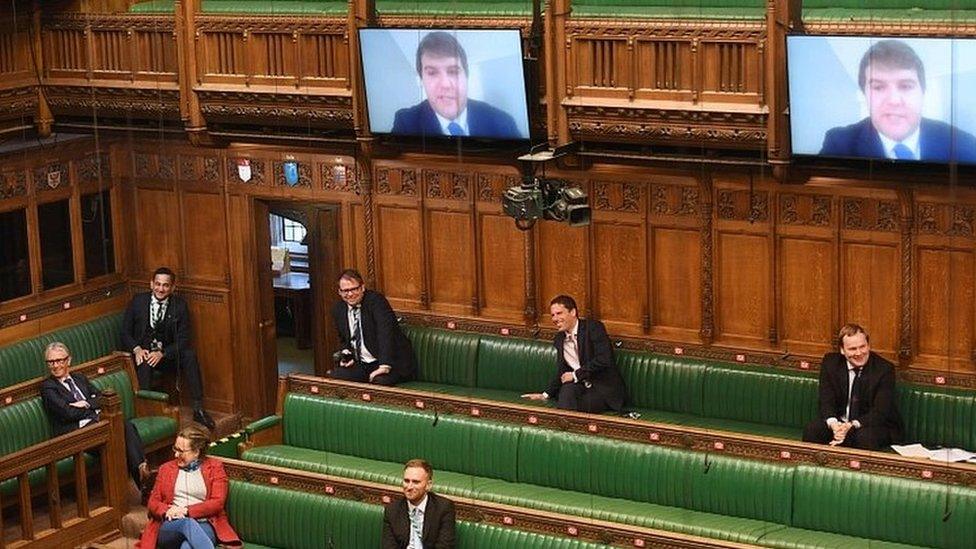Parliament: MPs warn of 'premature' return to business as usual
- Published

Opposition MPs have warned against an early return to business as normal in Parliament, warning ministers it would be a "retrograde step".
Commons leader Jacob Rees-Mogg has suggested the current largely virtual proceedings will end on 2 June as they are stifling debate and scrutiny.
But Labour's Chris Bryant said such a move would be "premature".
And the SNP's Hannah Bardell said it risked "locking out" her party and other MPs unable to travel to London.
Strict social distancing measures have been in force in Parliament for the past five weeks under a system of "hybrid" arrangements approved by MPs.
No more than 50 MPs are allowed in the Chamber at any one time while the first remote vote took place on Tuesday, with MPs casting their ballots via their laptops rather than in person.
The arrangements were extended on Tuesday until 21 May, when Parliament breaks for the 10-day Whitsun recess.
But Mr Rees-Mogg has signalled he wants MPs to return to "physical ways of working" as quickly as possible after Parliament resumes, to "set an example" to the public.
'Virtual veneer'
Speaking in the Commons on Wednesday, he said that "while things could change", his "current expectation" was that MPs would return to more traditional working arrangements early next month.
He suggested MPs were now operating in a "virtual veneer of a Parliament" and not able to do their job properly.
"We have no flexibility of questions, no ability for people to come in, to join in the debate, no ability to advance arguments or take them forward," he said.
"Simply a series of prepared statements made one after another. That's not the House of Commons doing it's proper duty, it's proper role of scrutiny of the government."
He suggested bringing MPs back to Westminster would not be contradicting the government's current coronavirus guidance, which still advises people to work from home if they can, so long as working conditions were safe.
He said there were "acres" of space on the Parliamentary estate and staff could continue to work from home.
He said it was quite possible to uphold social distancing in the main Chamber, given that it was rarely full during normal times, except for Prime Minister's Questions and other "high days and holidays".
'Retrograde step'
But several opposition MPs said Parliament would be acting in haste if it returned to business as normal while an effective lockdown remained in force across the UK and million of people were furloughed from work.
Labour's Chris Bryant said MPs were "choc a bloc" with work in their constituencies and suggested there was a "streak of Trump" about trying to make an example of them.
"There are libertarians in the government who would side with those who want to get rid of the lockdown as soon as possible and if there's collateral damage then so be it," he said.
And the SNP's Hannah Bardell said reverting to business as normal would be a "massive retrograde step", saying she would be adhering to the Scottish government's guidance to work from home.
"The digital system and voting system is working well and there's an opportunity to develop it further," she said.
And she warned that MPs from Scotland, Wales and Northern Ireland would struggle to be able to make it London, given the current restrictions on travel.
"We should not be forced into the position where we're locked out further from the parliamentary process because of our geographical position."
Commons Speaker Sir Lindsay Hoyle has said he could suspend sittings if the Commons became too crowded.
He also suggested that it could take up to an hour for MPs to vote in person if they reverted to the conventional process of trooping through two division lobbies.
Downing Street said it was "vital that Parliament can continue to scrutinise the government and legislate to support the coronavirus response".
"The existing temporary arrangements limit some of these functions, in particular regard to legislation, and that's why work is ongoing… to carefully move back to more ordinary business," No 10 said.
Asked whether the government was concerned about Scottish MPs not being able to travel to Westminster, the spokesman said that was "a matter for them".

Jacob Rees-Mogg's announcement took many by surprise.
And if the government doesn't table a motion to extend this virtual way of working, then it will automatically lapse. But, in the age of social distancing, lapse to what?
I understand ideas being examined include a rota for MPs so that no more than 50 continue to be allowed in the chamber at any one time. Hundreds and hundreds of parliamentary staff, meanwhile, would still be encouraged to work from home.
And while MPs would, yes, go through the lobby to vote, a system known as "pairing" might be used in recognition of the fact that not everyone can yet return to Westminster.
Pairing is an arrangement which normally sees two MPs, of opposing parties, not voting on an issue in order to cancel each other out.
But even if fewer people vote the process will still be slow as MPs, who would usually cram through the lobbies, politely queue two metres apart.
As the details are worked through, expect resistance; objections that a move back to the 'physical' will create a two-tier system of MPs, favourable to those who live nearer London and have less reason to fear a risk of travelling.
While some believe seeing MPs pouring back into Parliament will set the wrong example, others say it would set exactly the right one; leading the way as the country's asked to go back to work.
As with so much in politics, it's a matter of perspective.
